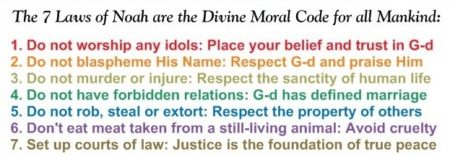
ב''ה
 Subscribe to our
Subscribe to ourHere is a condensed answer, along with a short video of a talk by the Rebbe on this subject:
From the translated words of the Rebbe in the above video:
They must be based on the belief that G-d commanded these [seven] laws through Moses. They are not rules made by people… they are a system based on the premise that there is an Entity [G-d] which created and directs all of creation. This Supernal Being conveyed – through Moses our teacher in the Torah – clear instructions that guide our actions… the Seven Laws of Noah comprise seven all-inclusive categories, each of which contains numerous details… and they have a lasting existence…
(1) In this light, within Torah Law, the Seven Laws of Noah comprise seven broad categories. Each of them include numerous details, with both warnings and ramifications (i.e., additional logical obligations). A Gentile who learns and observes them is righteous in G-d’s eyes. Examples are: giving charity, honoring parents, keeping vows, not deceiving others, prayer to G-d, repenting and making restitution, etc.

(2) The Rebbe is referring to the connection between the Noahide Laws and matters of faith. See Laws of Kings 8:11 (the introduction paragraph in this linked essay).
Thus, attaching the description of “righteous” to observance of the Noahide Laws can only be correct if they are accepted and observed correctly. Their name in the original Hebrew specifies this: Sheva Mitzvos Bnai Noach = Seven Commandments [from G-d] for the Descendants of Noah.
In The Divine Code, Part I, Chapter I, Rabbi Moshe Weiner of Jerusalem lists Rambam’s three categories of “deviant believer” (“min” in Hebrew), “scorner,” (“epicurus” in Hebrew), and “denier of Torah.” He also lists principles of faith that each of them reject. In total, those are the principles that a Gentile must accept after he has learned about the truth of Torah, in order to be worthy of receiving a part in the future eternal World to Come as a Pious Gentile (Hassid Umot Ha’olom in Hebrew). This is a spiritual level that is above the designation of “righteous.”
All of the detailed principles of faith which Rabbi Weiner listed there fall within the following 5 general principles:
a. Acceptance of the one and only G-d.
b. G-d has interest in people and He gave commandments to mankind. [I.e., mankind was not created for nothing, but for the purpose of serving G-d in physical activity].
c. G-d gives reward and punishment for a person’s deeds.
d. G-d connects Himself to mankind through prophecy.
e. G-d gave commands in the Torah that are of an eternal nature and that will not change or bend forever.
The following is a restatement of those 5 general principles, with all of their details from The Divine Code (loc. cit.) included. All of these principles of faith have source verses in the Hebrew Bible:
a. Acceptance of the one and only G-d, Who is the only First Existence and the Creator of everything else that exists, Who oversees and controls the universe with no intermediary independent powers, and Who has no body and no form.
b. G-d has interest in people and knows all of their actions. He also gave commandments to mankind. [I.e., mankind was not created for nothing, but rather for the purpose of serving G-d in physical activity].
c. G-d gives reward and punishment for a person’s deeds.
d. G-d connects Himself to mankind through prophecy, and the primary prophecy of all was to Moses our teacher.
e. G-d Himself – through His prophecy to Moses – gave the commandments in the Written Torah, and the explanations of those commandments in the Oral Torah. These are of an eternal nature and will not change or bend forever, nor will any of them ever be replaced or nullified.
For comparison, see Rambam’s list and explanation of the 13 Fundamental Principles of the Jewish Faith, all of which are of course universally true for both Jew and Gentiles. The above 5 principles are included within these 13, and this explanation by Rambam includes source verses.
You can also read the Q&A thread titled “Principles of Noahide Faith” in our on-line Forum:
https://www.asknoah.org/forum/showthread.php?tid=292